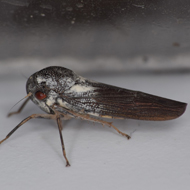
The insect's closest known relative was last spotted in 1969.
A scientist from Anglia Ruskin University, Cambridge, has identified an incredibly rare new species of insect.
Dr Alvin Helden discovered the leafhopper in Kibale National Park, west Uganda, and named the insect Phlogis kibalensis.
The insect is closely related to cicadas, but is significantly smaller – the male of the Phlogis kibalensis species is only 6.5mm long.
The newly-discovered species has a pitted body and a metallic sheen, and has uniquely-shaped male reproductive organs.
Published in the journal Zootaxa, the unusual discovery is significant, as the last recorded sighting of a leafhopper from the Phlogis genus was in a different country – the Central African Republic – in 1969.
Dr Helden said: "Leafhoppers of this genus, and the wider tribe, are very unusual in appearance, and are rarely found.
“In fact, they are so incredibly rare that their biology remains almost completely unknown, and we know almost nothing about Phlogis kibalensis, the new species I found, including what plants it feeds on or its role in the local ecosystem.
“There is so much still to find out, not just about this species but so many others, including the many species that are still waiting to be discovered.”
Image (C) Anglia Ruskin University



 The RCVS has announced a new version of its 1CPD mobile app, with enhanced features for veterinary surgeons and veterinary nurses to record their continuing professional development.
The RCVS has announced a new version of its 1CPD mobile app, with enhanced features for veterinary surgeons and veterinary nurses to record their continuing professional development.